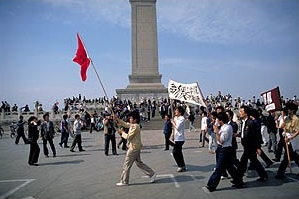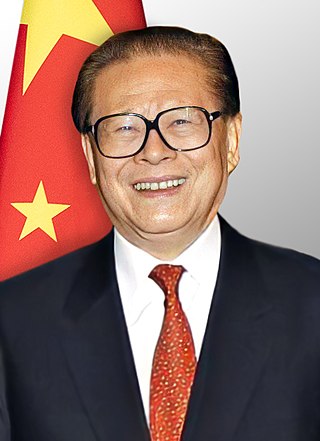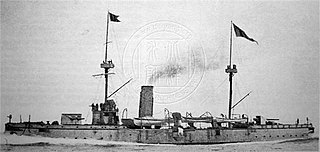This article needs additional citations for verification .(June 2014) |
| |||||
| Decades: | |||||
|---|---|---|---|---|---|
| See also: | Other events of 1894 History of China • Timeline • Years | ||||
Events in the year 1894 in China .
This article needs additional citations for verification .(June 2014) |
| |||||
| Decades: | |||||
|---|---|---|---|---|---|
| See also: | Other events of 1894 History of China • Timeline • Years | ||||
Events in the year 1894 in China .

Deng Xiaoping was a Chinese revolutionary leader, military commander and statesman who served as the paramount leader of the People's Republic of China (PRC) from December 1978 to November 1989. After Chinese Communist Party chairman Mao Zedong's death in 1976, Deng gradually rose to supreme power and led China through a series of far-reaching market-economy reforms earning him the reputation as the "Architect of Modern China". He contributed to China becoming the world's second-largest economy by nominal GDP in 2010.

The Tiananmen Square protests, known in Chinese as the June Fourth Incident were student-led demonstrations held in Tiananmen Square, Beijing, during 1989. In what is known as the Tiananmen Square Massacre, or in Chinese the June Fourth Clearing or June Fourth Massacre, Chinese government troops violently suppressed the demonstrators and those trying to block the military's advance into Tiananmen Square. The protests started on 15 April and were forcibly suppressed on 4 June when the government sent the People's Liberation Army to occupy parts of central Beijing. Estimates of the death toll vary from several hundred to several thousand, with thousands more wounded. The popular national movement inspired by the Beijing protests is sometimes called the '89 Democracy Movement or the Tiananmen Square Incident.

The Cultural Revolution, formally known as the Great Proletarian Cultural Revolution, was a sociopolitical movement in the People's Republic of China (PRC) launched by Mao Zedong in 1966, and lasting until his death in 1976. Its stated goal was to preserve Chinese communism by purging remnants of capitalist and traditional elements from Chinese society. The Revolution marked the effective commanding return of Mao—who was still the chairman of the Chinese Communist Party (CCP)—to the centre of power, after a period of self-abstention and ceding to less radical leadership in the aftermath of the Mao-led Great Leap Forward debacle and the Great Chinese Famine (1959–1961). The Revolution failed to achieve its main goals.

Jiang Zemin was a Chinese politician who served as general secretary of the Chinese Communist Party (CCP) from 1989 to 2002, as chairman of the Central Military Commission from 1989 to 2004, and as president of China from 1993 to 2003. Jiang was paramount leader of China from 1989 to 2002. He was the core leader of the third generation of Chinese leadership, one of four core leaders alongside Mao Zedong, Deng Xiaoping and Xi Jinping.

Hua Guofeng, was a Chinese politician who served as Chairman of the Chinese Communist Party and Premier of the People's Republic of China. The designated successor of Mao Zedong, Hua held the top offices of the government, party, and the military after the deaths of Mao and Premier Zhou Enlai, but was gradually forced out of supreme power by a coalition of party leaders between December 1978 and June 1981, and subsequently retreated from the political limelight, though still remaining a member of the Central Committee until 2002.

Zhao Ziyang was a Chinese politician. He was the third premier of the People's Republic of China from 1980 to 1987, vice chairman of the Chinese Communist Party (CCP) from 1981 to 1982, and CCP general secretary from 1987 to 1989. He was in charge of the political reforms in China from 1986, but lost power in connection with the reformative neoauthoritarianism current and his support of the 1989 Tiananmen Square protests.

Liu Bocheng was a Chinese military commander and Marshal of the People's Liberation Army.

Wendi Deng Murdoch is a Chinese-born American entrepreneur, investor, film producer, and collector of Chinese contemporary art.
The history of the People's Liberation Army began in 1927 with the start of the Chinese Civil War and spans to the present, having developed from a peasant guerrilla force into the largest armed force in the world.

Deng Shichang, courtesy name Zhengqing, posthumous name Zhuangjie, was an Imperial Chinese Navy officer who lived in the late Qing dynasty. He is best known for his service in the Beiyang Fleet during the First Sino-Japanese War as the captain of the protected cruiser Zhiyuan. He participated in the Battle of the Yalu River on 17 September 1894 against the Imperial Japanese Navy. After Zhiyuan was sunk in battle, he refused to be rescued and eventually went down with his ship. He was posthumously awarded the position of taizi shaobao by the Qing government and honoured as a hero in the Shrine of Loyalty in Beijing.
The history of the People's Republic of China details the history of mainland China since 1 October 1949, when CCP chairman Mao Zedong proclaimed the People's Republic of China (PRC) from atop Tiananmen, after a near complete victory (1949) by the Chinese Communist Party (CCP) in the Chinese Civil War. The PRC is the most recent political entity to govern mainland China, preceded by the Republic of China and thousands of years of monarchical dynasties. The paramount leaders have been Mao Zedong (1949-1976); Hua Guofeng (1976-1978); Deng Xiaoping (1978-1989); Jiang Zemin (1989-2002); Hu Jintao (2002-2012); and Xi Jinping.

Zhiyuan was a protected cruiser built for the Imperial Chinese Navy. She was built by Armstrong Whitworth in Elswick, England. She was one of two Zhiyuan-class protected cruisers built, alongside her sister ship Jingyuen. Zhiyuan was armed with a smaller number of large sized naval guns, as opposed to later ships of this type which carried a larger number of smaller guns. This was because the medium-calibre quick-firing gun had yet to be introduced, thus a warship's firepower at the time was largely a function of individual shell weight rather than volume of fire. Both ships were assigned to the Beiyang Fleet, and she was captained by Deng Shichang throughout her life.
Sun Li, also known as Susan Sun, is a Chinese actress. In 2018, she became the youngest Chinese actress to win the "Grand Slam", after winning the three biggest television awards, the Flying Apsaras Awards, Golden Eagle Awards and the Magnolia Awards.

Qin Jiwei was a general of the People's Republic of China, Minister of National Defense and a member of the Chinese Communist Party Politburo.

Deng Zhuoxiang is a Chinese footballer who plays as a midfielder for Wuhan Three Towns.

Deng Chao is a Chinese actor, comedian, director and singer. His recent films, The Breakup Guru (2014), The Mermaid (2016) and Duckweed (2017) are among the highest-grossing Chinese films of all time in China. In 2017, Deng was crowned Best Actor at the Golden Rooster Awards for his performance in The Dead End (2015). He was a cast member and leader of the popular variety program, Keep Running.
Events in the year 1946 in the Republic of China. This year is numbered Minguo 35 according to the official Republic of China calendar.
Events from the year 1933 in China.

Deng Zhongxia was an early member of the Chinese Communist Party and an important Marxist intellectual and labor movement leader. Having led many strikes and uprisings against Chiang Kai-shek's Kuomintang government, he became one of the most wanted CCP members by the Kuomintang. He was captured and executed in 1933.

The Sino-Japanese War at Sea 1894 is a 2012 Chinese historical war film directed and written by Feng Xiaoning, starring Lu Yi, Xia Yu and others. It is based on the events in the First Sino-Japanese War of 1894–1895, with emphasis on the naval battles and the career of the Chinese naval officer Deng Shichang. The film premiered in China at the International Convention Centre in Weihai, Shandong, on 26 June 2012.